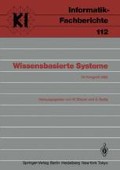Abstract
The basic idea underlying the approach outlined in this paper is that commonsense knowledge may be regarded as a collection of dispositions, that is, propositions which are preponderantly, but not necessarily always, true. Technically, a disposition may be interpreted as a proposition with implicit fuzzy quantifiers, e.g., most, almost all, usually, often etc. For example, a disposition such as Swedes are blond may be interpreted as most Swedes are blond For purposes of inference from commonsense knowledge, the conversion of a disposition into a proposition with explicit fuzzy quantifiers sets the stage for an application of syllogistic reasoning in which the premises are allowed to be of the form Q A’s are B’s whereA and B are fuzzy predicates and Q is a fuzzy quantifier. In general, the conclusion yielded by such reasoning is a proposition which may be converted into a disposition through the suppression of fuzzy quantifiers.
Access this chapter
Tax calculation will be finalised at checkout
Purchases are for personal use only
Preview
Unable to display preview. Download preview PDF.
References and Related Publications
J. Doyle, “A truth-maintenance system,” Artificial Intelligence 12, pp. 231–272, 1979.
D. Dubois and H. Prade, Fuzzy Sets and Systems: Theory and Applications. New York: Academic Press, 1980.
J.A. Goguen, “The logic of inexact concepts,” Synthese 19, pp. 325–373, 1969.
A. Kaufmann and M.M. Gupta, Introduction to Fuzzy Arithmetic. New York: Van Nostrand, 1935.
E.H. Mamdani and B.R. Gaines, Fuzzy Reasoning and its Applications. London: Academic Press, 1981.
J. McCarthy. “Circumscription: A non-monotonic inference rule,” Artificial Intelligence 13, pp. 27–40, 1980.
D.V. McDermott and J. Doyle. “Non-monotonic logic. I.” Artificial Intelligence 13, pp. 41–72, 1980.
D.V. McDermott. “Non-monotonic logic, II: nonmonotonic modal theories.” J. Assoc. Comp. Mach 29, pp. 33–57, 1982.
R.C. Moore and J.R. Hobbs, (eds.), Formal Theories of the Commonsense World. Harwood. NJ:Ablex Publishing. 1984.
C.V. Negoita. Expert Systems and Fuzzy Systems. Menlo Park: Benjamin/Cummings. 1985.
N. Nilsson. Probabilistic logic. SRI Tech. Note 321. Menlo Park. CA. 1984.
R. Reiter and G. Criscuolo, “Some representational issues in default reasoning,” Computers and Mathematics 9, pp. 15–28, 1983.
M. Sugeno, “Fuzzy measures and fuzzy integrals: a survey,” in Fuzzy Automata and Decision Processes. M.M. Gupta, G.N. Saridis and B.R. Gaines, (eds.), Amsterdam:North-Holland, pp. 89–102, 1977.
R.R. Yager, “Quantified propositions in a linguistic logic,” in: Proceedings of the 2nd International Seminar on Fuzzy Set Theory. E.P. Klement, (ed.), Johannes Kepler University, Linz, Austria, 1980.
L.A. Zadeh, “A theory of approximate reasoning,” Electronics Research Laboratory Memorandum M77/58, University of California. Berkeley. 1977. Also in: Machine Intelligence 9. J.E. Hayes. D. Michie and LI. Kulich. (eds.). New York: Wiley. pp. 149–194. 1979.
L.A. Zadeh, “A theory of approximate reasoning,” Electronics Research Laboratory Memorandum M77/58, University of California. Berkeley. 1977. Also in: Machine Intelligence 9. J.E. Hayes. D. Michie and LI. Kulich. (eds.). New York: Wiley. pp. 149–194. 1979.
L.A Zadeh. “Test-score semantics for natural languages and meaning-representation via PRUF,” Tech. Note 247, AI Center, SRI International, Menlo Park, CA, 1981. Also in Empirical Semantics. B.B. Rieger, (ed.), Bochum:Brockmeyer, pp. 281–349, 1981.
L.A. Zadeh, “The role of fuzzy logic in the management of uncertainty in expert systems,” Fuzzy Sets and Systems 11, pp. 199–227, 1983.
L.A Zadeh, “A theory of commonsense knowledge,” in Issues of Vagueness. H.J. S. Skala Termini and E. Trillas, (eds.), pp. 257–296, Dordrecht.-Reidel, 1934.
L.A. Zadeh, “Syllogistic reasoning in fuzzy logic and its application to usuality and reasoning with dispositions,” to appear in the IEEE Trans, on Systems, Man and Cybernetics, 1995.
M. Zemankova-Leech and A. Kandel, Fuzzy Relational Data Bases - A Key to Expert Systems. Cologne: Verlag TUV Rheinland, 1994
Author information
Authors and Affiliations
Editor information
Editors and Affiliations
Rights and permissions
Copyright information
© 1985 Springer-Verlag Berlin Heidelberg
About this paper
Cite this paper
Zadeh, L.A. (1985). A Fòrmalization of Commonsense Reasoning Based on Fuzzy Logic. In: Brauer, W., Radig, B. (eds) Wissensbasierte Systeme. Informatik-Fachberichte, vol 112. Springer, Berlin, Heidelberg. https://doi.org/10.1007/978-3-642-70840-4_29
Download citation
DOI: https://doi.org/10.1007/978-3-642-70840-4_29
Publisher Name: Springer, Berlin, Heidelberg
Print ISBN: 978-3-540-15999-5
Online ISBN: 978-3-642-70840-4
eBook Packages: Springer Book Archive

